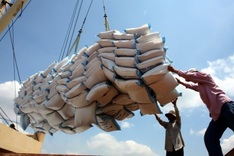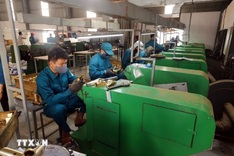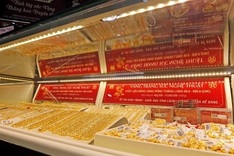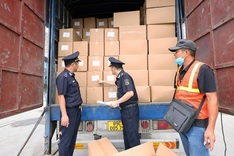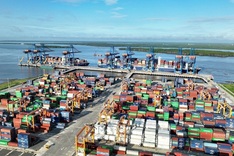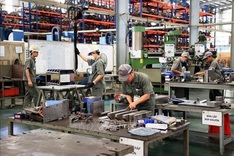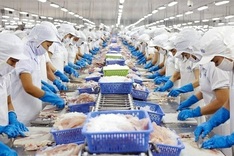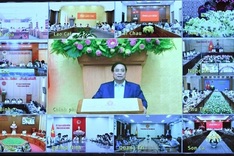Vietnamese sweet potato growers are facing increasing challenges to find outlet for their products.

Vietnamese farmers sell their products to Chinese traders
Chinese traders have started hiring land in the southern province of Vinh Long to grow sweet potatoes for exports to third countries.
Some 93,758 people in Vinh Long’s Binh Tan District are living off growing sweet potatoes. To date, they have raised the area for product to over 6,000 hectares. However, they have yet to source an alternative outlet to the Chinese traders.
Over 70% of sweet potatoes in Binh Tan and Binh Minh Districts are sold to China as unofficial exports. Chinese merchants have hired ten households to grow Japanese purple sweet potato in Binh Tan and Binh Minh which harvested receive Chinese labels.
A businessman in Binh Minh District’s Thuan An Commune, said, “Most of sweet potatoes are not officially exported to China but sold to Chinese merchants. Goods are often delivered across the border gate which Chinese traders dominate.”
According to Vo Van Theo, Head of Binh Tan District Department of Agriculture and Rural Development, sweet potatoes are the second most important export item in Vinh Long after rice.
“Unofficial exports of sweet potatoes, however, are sometimes risky. Farmers face difficulties in finding markets for their products. They just rely entirely upon chance,” Theo said.
“It’s vital to have somebody with a good understanding about procedures to sell goods to China’s Guangzhou via the Lang Son border gate. If not you may face barriers and fail,” said Huynh Ngoc Pho, a sweet potato grower. Pho, after suffering from price-dumping problems caused by Chinese traders, decided to establish a company to trade in the product.
When the price climbs to between VND16,000 and VND17,000 (USD0.77-USD0.82) per kilo, farmers rush to sell their products at the border gate. At that time, Chinese traders slash prices to between VND12,000 and VND13,000 a kilo, Theo noted.
“They often pay some money in advance to encourage farmers to transport their goods to the border gate. Chinese traders only open their warehouses to receive goods after farmers have been lining up for some days,” he shared.
Nguyen Van Phuoc, a former trader of sweet potatoes to China, said, “Chinese traders often prolong delivery times to force Vietnamese farmers to wait. They often mention unreasonable obstacles such as difficulties in custom declarations or tighter controls over quality quarantine. Farmers are compelled to sell their products at low rates, as farm produce such as watermelons and sweet potatoes often dramatically degrade after being exposed for a while.”
Pho called for the government’s support in finding new markets for their products, as China is currently their only outlet.
Chinese penetration
While farmers in Binh Minh and Binh Tan grow rotational crops of rice and sweet potatoes, Chinese traders have been hiring rice fields to entirely grow sweet potatoes at VND4-5 million (USD193.8-242.2) per 1,000 square metres of land.
Unaware of the traders’ tricks, local farmers are attracted by their rent rates as they can only earn around VND3 million (USD145.3) per 1,000 square metres by growing rice.
“There are no official statistics about the total area of land rented by Chinese people as they often do it under the names of Vietnamese farmers,” said Phan Thi Be, head of the district Department of Economics.
In addition to renting farm land, Chinese traders are trying to attract skilled workers to work on their farms and fight over collecting sweet potatoes for exports to third countries, Be emphasised.
Locals said that, last year, Chinese traders hired a combined 20 hectares of land under the names of Vietnamese farmers. They have been expanding their production from Giao Meo into areas along National Highway No. 54 and Tra On.
Some Vietnamese people have set up firm relationships with Chinese traders in order to rent land to them. One of this well-to-do group has hired as much as 200,000 hectares of land for Chinese traders. He is estimated to earn VND2 billion (USD96,899) after an initial investment of just VND3.8 billion (USD184,108).
Chinese traders often warn that they will recruit Chinese workers if Vietnamese skilled workers refuse to work on their farms, threatening a potential Chinese dominance of the sweet potato market.

